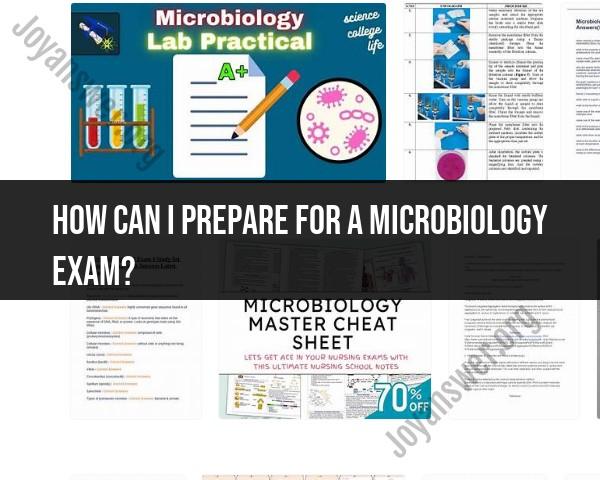How can I prepare for a microbiology exam?
How to Prepare for a Microbiology Exam: Study Tips and Strategies
Microbiology can be one of the most challenging subjects in the life sciences. With countless microorganisms to learn about, their structures, functions, and effects on humans, exams can feel overwhelming. The good news is that with the right strategies, you can prepare effectively and perform with confidence.
1. Review Your Lecture Notes Regularly
Instead of cramming at the last minute, review your notes after each class. This helps you reinforce concepts like microbial physiology, genetics, and immunity while they’re still fresh. Highlight key terms and write short summaries in your own words to deepen understanding.
2. Understand, Don’t Just Memorize
Microbiology exams often test application rather than rote memorization. For example, instead of just memorizing bacterial names, focus on understanding how they grow, reproduce, and cause disease. Try to explain concepts out loud as if you were teaching someone else.
3. Use Diagrams and Visuals
Microbiology involves many structures—bacterial cell walls, viral components, or immune system pathways. Drawing diagrams and labeling parts is a powerful way to memorize and understand processes. Visual learners especially benefit from charts, flow diagrams, and concept maps.
4. Practice with Flashcards
Flashcards are excellent for memorizing key terms, pathogens, and lab techniques. You can create your own or use apps like Quizlet. Focus on definitions, microbial classifications, and the differences between organisms (e.g., gram-positive vs. gram-negative bacteria).
5. Do Practice Questions
Work through past exams, textbook practice questions, or online quizzes. This will help you get familiar with the exam format and test your recall under time pressure. Practice questions also highlight areas where you need more review.
6. Master Lab Techniques
If your course involves a lab component, make sure you know common procedures like streak plating, Gram staining, or microscopy. Be prepared to explain why each step is done and what the expected outcomes mean.
7. Form a Study Group
Studying with peers allows you to discuss difficult topics, quiz each other, and clarify misunderstandings. Teaching a concept to someone else is one of the best ways to ensure you understand it yourself.
8. Stay Organized and Manage Time
Break your study sessions into manageable chunks and cover topics systematically (bacteriology, virology, immunology, etc.). Use a study calendar to track progress and avoid last-minute stress.
9. Take Care of Yourself
Don’t underestimate the importance of rest, hydration, and nutrition. Your brain functions best when you’re healthy, so avoid all-night cramming sessions right before the exam.
Final Thoughts
Preparing for a microbiology exam requires more than memorizing names and facts. By reviewing regularly, practicing actively, and focusing on understanding processes, you can strengthen your knowledge and boost your confidence. Remember: microbiology is all about connections—once you see how concepts fit together, the subject becomes much easier to master.
Mastering Your Microbiology Exam: A Comprehensive Guide
Microbiology can be a fascinating, yet challenging, subject. From understanding microscopic organisms to complex biochemical pathways, preparing for an exam requires a strategic approach. This guide will walk you through effective preparation techniques to help you ace your microbiology exam.
Preparing Effectively for a Microbiology Exam
Effective preparation begins with a clear understanding of what will be covered. Don't just skim your notes; actively engage with the material. Start early to avoid last-minute cramming, which is rarely effective for subjects with a large volume of detailed information like microbiology. Create a study schedule that breaks down topics into manageable chunks, allocating specific times for review and practice. Think of it as cultivating a bacterial colony – consistent nourishment (study) leads to robust growth (understanding).
Key Topics to Focus on in Microbiology
Microbiology encompasses a vast array of topics. To prepare effectively, identify the core concepts and high-yield areas. These typically include:
Bacterial Structure and Function: Understanding cell walls, membranes, flagella, pili, and their roles.
Microbial Metabolism: Glycolysis, fermentation, respiration, photosynthesis, and their variations in different microbes.
Genetics and Gene Expression: Replication, transcription, translation, mutations, and gene transfer mechanisms (conjugation, transformation, transduction).
Control of Microbial Growth: Sterilization, disinfection, antibiotics, and their mechanisms of action.
Immunology Basics: Innate and adaptive immunity, antigens, antibodies, and immune responses.
Pathogenesis and Virulence Factors: How microbes cause disease and the tools they use.
Major Groups of Microorganisms: Key characteristics of bacteria, viruses, fungi, and protists.
Pay close attention to topics emphasized by your instructor, as these are often good indicators of exam content.
Study Techniques and Resources
Beyond just reading, employ a variety of active study techniques:
Flashcards: Ideal for memorizing microbial names, structures, virulence factors, and antibiotic mechanisms.
Concept Maps: Visually connect related ideas, processes, and disease pathways. This helps in understanding the bigger picture.
Summarizing and Teaching: After reviewing a topic, try to summarize it in your own words or explain it to a study partner. This reveals gaps in your understanding.
Drawing Diagrams: Sketching bacterial cells, viral replication cycles, or metabolic pathways can solidify your memory.
Mnemonics: Create memorable phrases or acronyms for lists or complex sequences.
Utilize all available resources: your textbook, lecture notes, supplementary readings, and online educational videos (e.g., YouTube channels dedicated to microbiology). Don't hesitate to attend office hours to clarify difficult concepts with your professor or teaching assistant.
Practicing with Past Exams and Quizzes
One of the most effective ways to prepare is by practicing under exam conditions. If available, use past exams or quizzes provided by your instructor. If not, create your own practice questions. This helps you:
Familiarize yourself with the question format (e.g., multiple choice, short answer, essay).
Identify areas of weakness that require further review.
Manage your time effectively during the actual exam.
Reduce exam anxiety by knowing what to expect.
Review your answers thoroughly, understanding why a particular answer is correct and why others are incorrect.
Time Management Tips for Exam Success
Effective time management is crucial both during your study period and on exam day:
During Study: Break down large topics into smaller, manageable study sessions. Use the Pomodoro Technique (25 minutes study, 5 minutes break) to maintain focus. Prioritize harder topics.
Before the Exam: Get adequate rest the night before. A well-rested mind performs better than an exhausted one.
On Exam Day:
Read all instructions carefully before starting.
Scan the entire exam to gauge its length and the types of questions.
Allocate time per question based on its point value and difficulty.
Answer questions you know first to build confidence and secure easy points.
Don't dwell too long on a single difficult question. If you're stuck, make a note and move on, returning to it later if time permits.
Review your answers if time allows, checking for any missed questions or simple errors.












